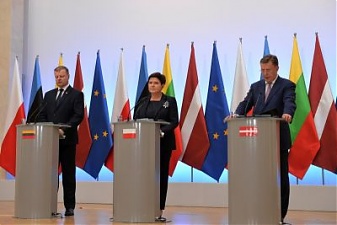Baltic States – CIS, Energy, EU – Baltic States, Legislation, Railways, Transport
International Internet Magazine. Baltic States news & analytics
Saturday, 31.01.2026, 13:03
Lithuania, Poland, Latvia to "shortly" sign deal on network synchronization
 Print version
Print version |
|---|
| Photo: mk.gov.lv |
Skvernelis, currently on a visit in Warsaw, said he had agreed with Poland's Prime Minister Beata Szydlo “to shortly sign the political agreement” on the project, which would aim to boost energy independence from Russia.
In his words, the Latvian and Estonian calls to proceed with the synchronization by way of building another electricity link are unacceptable, as they could procrastinate the process and leave the Baltic states dependent on the Moscow-controlled electricity ring.
"Poland's political approval to the synchronization of the Baltic electricity system with continental Europe via Poland is very important. We cannot postpone the project – it is a joint issue of national and energy security of the Baltic states," Skvernelis said at a joint news conference with his Polish counterpart in Warsaw on Tuesday.
Estonia's prime minister was also expected to attend the meeting, however, pulled out in the last minute. Estonia calls for a second power link between Lithuania and Poland, listing synchronization with the Nordic states as an alternative.
Skvernelis does not rule out that Lithuania could synchronize via Poland alone, if Latvia and Estonia do not support the solution.
Latvia supports synchronization of power grids in the three Baltic states
with the continental Europe via Poland, Latvian Prime Minister Maris Kucinskis
(Greens/Farmers) said during the meeting with Polish Prime Minister Beata
Szydlo and Lithuanian Prime Minister Saulius Skvernelis in Warsaw.
Kucinskis said that the system reliability and cost-effectiveness should be the priorities as regards synchronization of the Baltic power grids. Latvia supports synchronization of power grids in the three Baltic states with the continental Europe via Poland by two alternating current lines, he said, referring to the findings of the EU Joint Research Center, which had concluded that it was the best option.
The Baltic states still operate in sync with the post-Soviet energy system in the so-called BRELL ring and are dependent on the control center in Moscow and the Russian electricity network. To reduce the dependence on Moscow, the Baltic nations plan to connect with the European electricity system in a project to be completed by 2025.
The EU single market must be strengthened and the problems within the
single market need to be addressed, but not at the expense of competitiveness
and productivity, the Latvian prime minister said.
Speaking about the EU budget after 2020, Latvia's priority is closing the
gap between different EU member states, Kucinskis said.
The Latvian prime minister stressed the need for the Baltic states to
cooperate among themselves and for extending this cooperation to include also
Poland. "We have to think about joint action to secure financing for large
regional infrastructure projects, in particular Rail Baltica," he said.
The three prime ministers also discussed the Eastern Partnership and the
Eastern Partnership Summit to be held in Brussels in November this year.
Kucinskis said that visa-free travel for Ukrainians and ratification of the
EU-Ukraine Association agreement were major steps towards strengthening the
EU-Ukraine relations. He commended the progress made by Ukraine but said that
the country still had to accomplish a lot.
Security issues were in the focus of the meeting in Warsaw, with the
participants underlining the need to keep building the national and
international capacity to counter hybrid threats.
Latvia, Estonia, Lithuania and Poland have joined the European Center of
Excellence for Countering Hybrid Threats. Latvia is prepared to actively
participate in the center's operations and expects the center to contribute to
analysis of hybrid threats and countering of those threats.
Estonian Prime Minister Juri Ratas was also expected to attend the meeting
in Warsaw but canceled his trip to Poland at the last minute in order to deal
with the problem of a potential security risk detected in the chip of the
Estonian ID card. Estonia was represented at the meeting by its ambassador.








 «The Baltic Course» Is Sold and Stays in Business!
«The Baltic Course» Is Sold and Stays in Business!

